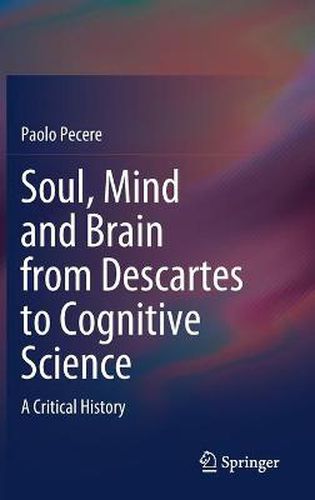Readings Newsletter
Become a Readings Member to make your shopping experience even easier.
Sign in or sign up for free!
You’re not far away from qualifying for FREE standard shipping within Australia
You’ve qualified for FREE standard shipping within Australia
The cart is loading…






This title is printed to order. This book may have been self-published. If so, we cannot guarantee the quality of the content. In the main most books will have gone through the editing process however some may not. We therefore suggest that you be aware of this before ordering this book. If in doubt check either the author or publisher’s details as we are unable to accept any returns unless they are faulty. Please contact us if you have any questions.
This interdisciplinary book ties the historical work of Descartes to his successors through current research and critical overviews on the neuroscience of consciousness, the brain, and cognition. This text is the first historical survey to focus on the cohesions and discontinuities between historical and contemporary thinkers working in philosophy, physiology, psychology, and neuroscience.
The book introduces and analyzes early discussions of consciousness, such as: metaphysical alternatives to scientific explanations of consciousness and its connection to brain activity; claims about the possibilities and limits of neuroscientific accounts of consciousness and cognition; and the proposition of a non-reductive naturalism concerning phenomenal consciousness and rationality. The author assesses the contributions of early philosophers and scientists on brain, consciousness and cognition, among them: Descartes, Malebranche, Spinoza, Leibniz, Locke, Newton, Haller, Kant, Fechner, Helmholtz and du Bois-Reymond. The work of these pioneers is related to that of modern researchers in physiology, psychology, neuroscience and philosophy of mind, including: Freud, Hilary Putnam, Herbert Feigl, Gerald Edelman, Jean-Pierre Changeux, Daniel Dennett and David Chalmers, amongst others. This text appeals to researchers and advanced students in the field.
$9.00 standard shipping within Australia
FREE standard shipping within Australia for orders over $100.00
Express & International shipping calculated at checkout
This title is printed to order. This book may have been self-published. If so, we cannot guarantee the quality of the content. In the main most books will have gone through the editing process however some may not. We therefore suggest that you be aware of this before ordering this book. If in doubt check either the author or publisher’s details as we are unable to accept any returns unless they are faulty. Please contact us if you have any questions.
This interdisciplinary book ties the historical work of Descartes to his successors through current research and critical overviews on the neuroscience of consciousness, the brain, and cognition. This text is the first historical survey to focus on the cohesions and discontinuities between historical and contemporary thinkers working in philosophy, physiology, psychology, and neuroscience.
The book introduces and analyzes early discussions of consciousness, such as: metaphysical alternatives to scientific explanations of consciousness and its connection to brain activity; claims about the possibilities and limits of neuroscientific accounts of consciousness and cognition; and the proposition of a non-reductive naturalism concerning phenomenal consciousness and rationality. The author assesses the contributions of early philosophers and scientists on brain, consciousness and cognition, among them: Descartes, Malebranche, Spinoza, Leibniz, Locke, Newton, Haller, Kant, Fechner, Helmholtz and du Bois-Reymond. The work of these pioneers is related to that of modern researchers in physiology, psychology, neuroscience and philosophy of mind, including: Freud, Hilary Putnam, Herbert Feigl, Gerald Edelman, Jean-Pierre Changeux, Daniel Dennett and David Chalmers, amongst others. This text appeals to researchers and advanced students in the field.